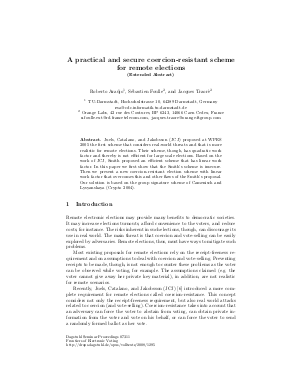A practical and secure coercion-resistant scheme for remote elections
Authors Roberto Araujo, Sébastien Foulle, Jacques Traoré
-
Part of:
Volume:
Dagstuhl Seminar Proceedings, Volume 7311
Part of: Series: Dagstuhl Seminar Proceedings (DagSemProc) - License:
 Creative Commons Attribution 4.0 International license
Creative Commons Attribution 4.0 International license
- Publication Date: 2008-01-15
File

PDF
DagSemProc.07311.3.pdf
- Filesize: 137 kB
- 6 pages
Document Identifiers
Metrics
- Access Statistics
-
Total Accesses (updated on a weekly basis)
0PDF Downloads0Metadata Views
Abstract
Election schemes, coercion-resistance, security Juels, Catalano, and Jakobsson (JCJ) proposed at WPES 2005 the first scheme that considers real-world threats and that is more realistic for remote elections. Their scheme, though, has quadratic work factor and thereby is not efficient for large scale elections. Based on the work of JCJ, Smith proposed an efficient scheme that has linear work factor. In this paper we first show that the Smith’s scheme is insecure. Then we present a new coercion-resistant election scheme with linear work factor that overcomes this and other flaws of the Smith’s proposal. Our solution is based on the group signature scheme of Camenisch and Lysyanskaya (Crypto 2004).
Cite As Get BibTex
Roberto Araujo, Sébastien Foulle, and Jacques Traoré. A practical and secure coercion-resistant scheme for remote elections. In Frontiers of Electronic Voting. Dagstuhl Seminar Proceedings, Volume 7311, pp. 1-6, Schloss Dagstuhl – Leibniz-Zentrum für Informatik (2008)
https://doi.org/10.4230/DagSemProc.07311.3
BibTex
@InProceedings{araujo_et_al:DagSemProc.07311.3,
author = {Araujo, Roberto and Foulle, S\'{e}bastien and Traor\'{e}, Jacques},
title = {{A practical and secure coercion-resistant scheme for remote elections}},
booktitle = {Frontiers of Electronic Voting},
pages = {1--6},
series = {Dagstuhl Seminar Proceedings (DagSemProc)},
ISSN = {1862-4405},
year = {2008},
volume = {7311},
editor = {David Chaum and Miroslaw Kutylowski and Ronald L. Rivest and Peter Y. A. Ryan},
publisher = {Schloss Dagstuhl -- Leibniz-Zentrum f{\"u}r Informatik},
address = {Dagstuhl, Germany},
URL = {https://drops.dagstuhl.de/entities/document/10.4230/DagSemProc.07311.3},
URN = {urn:nbn:de:0030-drops-12951},
doi = {10.4230/DagSemProc.07311.3},
annote = {Keywords: }
}
